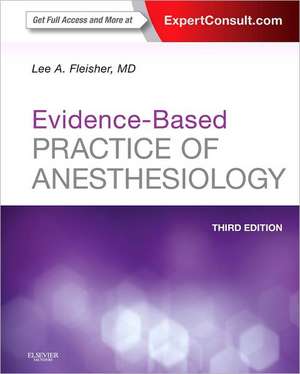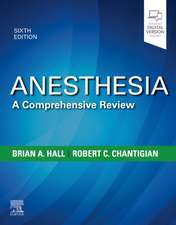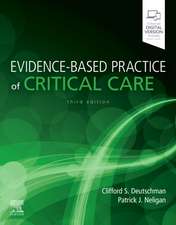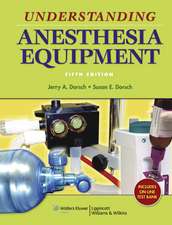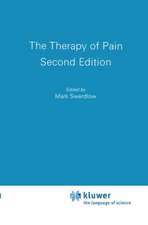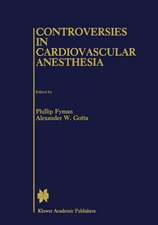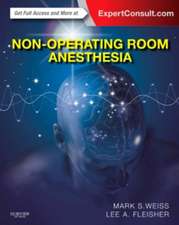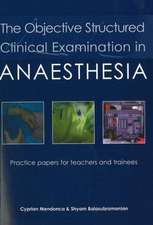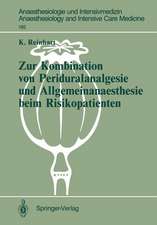Evidence-Based Practice of Anesthesiology
Autor Lee A. Fleisheren Limba Engleză Paperback – 26 mar 2013
| Toate formatele și edițiile | Preț | Express |
|---|---|---|
| Paperback (2) | 465.27 lei 27-39 zile | |
| Elsevier – 26 mar 2013 | 465.27 lei 27-39 zile | |
| Elsevier – 8 iul 2022 | 592.17 lei 2-4 săpt. | +204.19 lei 10-14 zile |
Preț: 465.27 lei
Preț vechi: 617.80 lei
-25% Nou
Puncte Express: 698
Preț estimativ în valută:
89.04€ • 92.39$ • 74.42£
89.04€ • 92.39$ • 74.42£
Carte disponibilă
Livrare economică 28 februarie-12 martie
Preluare comenzi: 021 569.72.76
Specificații
ISBN-13: 9781455727681
ISBN-10: 1455727687
Pagini: 612
Ilustrații: Approx. 30-40 illustrations.
Dimensiuni: 216 x 276 x 25 mm
Greutate: 1.27 kg
Ediția:3rd Edition.
Editura: Elsevier
ISBN-10: 1455727687
Pagini: 612
Ilustrații: Approx. 30-40 illustrations.
Dimensiuni: 216 x 276 x 25 mm
Greutate: 1.27 kg
Ediția:3rd Edition.
Editura: Elsevier
Public țintă
Anesthesiologists, CRNAsCuprins
Section I. Introduction
1: Evidence-Based Practice Parameters: The American Society of Anesthesiologists
Section II. Preoperative Preparation
2: Update on Preprocedure Testing
3: Is a Preoperative Screening Clinic Cost-Effective?
4: Who Should Have a Preoperative 12-Lead Electrocardiogram?
5: Is Routine Preoperative Pregnancy Testing Necessary?
6: What Are the Risk Factors for Perioperative Stroke?
7: Should We Delay Surgery in the Patient with Recent Cocaine Use?
8: Should All Antihypertensive Agents Be Continued before Surgery?
9: Is There an Optimal Timing for Smoking Cessation?
10: Which Patient Should Have a Preoperative Cardiac Evaluation (Stress Test)?
11: Should Patients with Stable Coronary Artery Disease Undergo Prophylactic Revascularization Before Noncardiac Surgery?
12: What are the Role and Management of Percutaneous Coronary Intervention for Noncardiac Surgery?
13: How Should We Prepare the Patient with a Pacemaker/Implantable Cardioverter-Defibrillator?
14: When Should Pulmonary Function Tests Be Performed Preoperatively?
Section III. Perioperative Management
15: Does the Airway Examination Predict Difficult Intubation?
16: Is there a Best Approach for Patients with Difficult Airways: Regional Versus General Anesthesia?
17: What is the Optimal Airway Management in Patients Undergoing Gastrointestinal Endoscopy?
18: Is There a Best Approach to Induction of Anesthesia in Emergent Situations?
19: Do Inhalational Agents Have Beneficial or Harmful Effects on Ischemia-Reperfusion Injury?
20: Does Anesthetic Choice Affect Surgical and Recovery Times?
21: What Are the Benefits of Different Ventilatory Techniques?
22: Is There an Optimal Perioperative Hemoglobin?
23: When Are Platelets and Plasma Transfusions Indicated?
24: What Drugs Decrease Postoperative Bleeding?
25: Does Perioperative Hyperglycemia Increase Risk? Should We Have Aggressive Glucose Control Perioperatively?
26: When and Why Should Perioperative Glucocorticoid Replacement Be Administered?
27: Does the Choice of Fluid Matter in Major Surgery?
28: What Works in a Patient with Acute Respiratory Distress Syndrome?
29: What Actions Can Be Used to Prevent Peripheral Nerve Injury?
30: What Is the Best Means of Preventing Perioperative Renal Injury?
31: Does Nitrous Oxide Affect Outcome?
32: Are Alpha-2 Agonists Effective in Reducing Perioperative Cardiac Complications in Noncardiac Surgery?
33: What is the Role of Ketamine for Perioperative Management?
34: Should Hypothermia be used Routinely After Intraoperative Cardiac Arrest?
35: Which Are the Best Techniques for Reducing the Incidence of Postoperative Deep Vein Thrombosis?
36: Are There Special Techniques in Obese Patients?
37: Is There an Ideal Approach to the Patient Susceptible to Malignant Hyperthermia?
38: What Is the Best Strategy for Prevention of Postoperative Nausea and Vomiting?
39: How Should Beta-blockers be used Perioperatively?
40: How Can We Prevent Postoperative Cognitive Dysfunction?
41: Do Intensive Care Specialists Improve Patient Outcomes?
42: Fast-Track Cardiac Anesthesia What Works Best for Safety and Efficacy?
43: Can We Prevent Recall During Anesthesia?
44: Are Patients with Sleep Apnea Appropriate for Ambulatory Surgery?
45: What Criteria Should Be Used for Discharge after Outpatient Surgery?
46: What Must I Consider in Order to Safely Anesthetize Someone in the Office Setting?
47: Is Propofol Safe if Given by Nonanesthesia Providers?
48: Aspiration: Is There an Optimal Management Strategy?
Section IV. Regional Anesthesia
49: Nonsteroidal Antiinflammatory Drugs, Antiplatelet Medications, and Spinal Axis Anesthesia
50: DVT Prophylaxis with Heparin and Heparin-like Drugs (UH, LMWH, Fondaparinux, and Rivaroxaban) Used in Combination with Neuraxial Anesthesia and Deep Plexus Blocks
51: Is Regional Anesthesia Appropriate for Outpatient Surgery?
52: What is the Best Technique for Hip Surgery?
53: Does Intraoperative Regional Anesthesia Decrease Perioperative Blood Loss?
54: What Is the Optimal Management of Postdural Puncture Headache?
55: Should Ultrasound Guidance Be Used for Peripheral Nerve Blockade?
56: Should Regional Anesthesia be Used for Orthopedic Trauma Patients?
Section V. Monitoring
57: What Is the Best Method of Diagnosing Perioperative Myocardial Infarction?
58: Does Neurologic Electrophysiologic Monitoring Affect Outcome?
Section VI. Cardiovascular Anesthesia
59: Is Regional Superior to General Anesthesia for Infrainguinal Revascularization?
60: Is There a Best Technique to Decrease Blood Loss and Transfusion after Coronary Artery Bypass Grafting?
61: Should Thoracic Epidural/Spinal Analgesia Be Used for Coronary Artery Bypass Grafting?
Section VII. Neurosurgical Anesthesia
62: Is There a Best Technique in the Patient with Increased Intracranial Pressure?
63: What Works for Brain Protection?
Section VIII. Obstetric Anesthesia
64: Anesthesia for Cesarean Delivery: Regional or General?
65: When Should a Combined Spinal-Epidural Be Used?
66: Does Labor Analgesia Affect Labor Outcome?
67: Does Anesthesia Increase the Risk to the Parturient Undergoing Nonobstetric Surgery?
Section IX. Pediatric Anesthesia
68: How Young Is the Youngest Infant for Outpatient Surgery?
69: Should a Child with a Respiratory Tract Infection Undergo Elective Surgery?
70: When Should Regional Anesthesia be Used in Pediatric Patients?
Section X. Pain Management
71: Optimal Postoperative Analgesia
72: Is Pre-emptive Analgesia Clinically Effective?
1: Evidence-Based Practice Parameters: The American Society of Anesthesiologists
Section II. Preoperative Preparation
2: Update on Preprocedure Testing
3: Is a Preoperative Screening Clinic Cost-Effective?
4: Who Should Have a Preoperative 12-Lead Electrocardiogram?
5: Is Routine Preoperative Pregnancy Testing Necessary?
6: What Are the Risk Factors for Perioperative Stroke?
7: Should We Delay Surgery in the Patient with Recent Cocaine Use?
8: Should All Antihypertensive Agents Be Continued before Surgery?
9: Is There an Optimal Timing for Smoking Cessation?
10: Which Patient Should Have a Preoperative Cardiac Evaluation (Stress Test)?
11: Should Patients with Stable Coronary Artery Disease Undergo Prophylactic Revascularization Before Noncardiac Surgery?
12: What are the Role and Management of Percutaneous Coronary Intervention for Noncardiac Surgery?
13: How Should We Prepare the Patient with a Pacemaker/Implantable Cardioverter-Defibrillator?
14: When Should Pulmonary Function Tests Be Performed Preoperatively?
Section III. Perioperative Management
15: Does the Airway Examination Predict Difficult Intubation?
16: Is there a Best Approach for Patients with Difficult Airways: Regional Versus General Anesthesia?
17: What is the Optimal Airway Management in Patients Undergoing Gastrointestinal Endoscopy?
18: Is There a Best Approach to Induction of Anesthesia in Emergent Situations?
19: Do Inhalational Agents Have Beneficial or Harmful Effects on Ischemia-Reperfusion Injury?
20: Does Anesthetic Choice Affect Surgical and Recovery Times?
21: What Are the Benefits of Different Ventilatory Techniques?
22: Is There an Optimal Perioperative Hemoglobin?
23: When Are Platelets and Plasma Transfusions Indicated?
24: What Drugs Decrease Postoperative Bleeding?
25: Does Perioperative Hyperglycemia Increase Risk? Should We Have Aggressive Glucose Control Perioperatively?
26: When and Why Should Perioperative Glucocorticoid Replacement Be Administered?
27: Does the Choice of Fluid Matter in Major Surgery?
28: What Works in a Patient with Acute Respiratory Distress Syndrome?
29: What Actions Can Be Used to Prevent Peripheral Nerve Injury?
30: What Is the Best Means of Preventing Perioperative Renal Injury?
31: Does Nitrous Oxide Affect Outcome?
32: Are Alpha-2 Agonists Effective in Reducing Perioperative Cardiac Complications in Noncardiac Surgery?
33: What is the Role of Ketamine for Perioperative Management?
34: Should Hypothermia be used Routinely After Intraoperative Cardiac Arrest?
35: Which Are the Best Techniques for Reducing the Incidence of Postoperative Deep Vein Thrombosis?
36: Are There Special Techniques in Obese Patients?
37: Is There an Ideal Approach to the Patient Susceptible to Malignant Hyperthermia?
38: What Is the Best Strategy for Prevention of Postoperative Nausea and Vomiting?
39: How Should Beta-blockers be used Perioperatively?
40: How Can We Prevent Postoperative Cognitive Dysfunction?
41: Do Intensive Care Specialists Improve Patient Outcomes?
42: Fast-Track Cardiac Anesthesia What Works Best for Safety and Efficacy?
43: Can We Prevent Recall During Anesthesia?
44: Are Patients with Sleep Apnea Appropriate for Ambulatory Surgery?
45: What Criteria Should Be Used for Discharge after Outpatient Surgery?
46: What Must I Consider in Order to Safely Anesthetize Someone in the Office Setting?
47: Is Propofol Safe if Given by Nonanesthesia Providers?
48: Aspiration: Is There an Optimal Management Strategy?
Section IV. Regional Anesthesia
49: Nonsteroidal Antiinflammatory Drugs, Antiplatelet Medications, and Spinal Axis Anesthesia
50: DVT Prophylaxis with Heparin and Heparin-like Drugs (UH, LMWH, Fondaparinux, and Rivaroxaban) Used in Combination with Neuraxial Anesthesia and Deep Plexus Blocks
51: Is Regional Anesthesia Appropriate for Outpatient Surgery?
52: What is the Best Technique for Hip Surgery?
53: Does Intraoperative Regional Anesthesia Decrease Perioperative Blood Loss?
54: What Is the Optimal Management of Postdural Puncture Headache?
55: Should Ultrasound Guidance Be Used for Peripheral Nerve Blockade?
56: Should Regional Anesthesia be Used for Orthopedic Trauma Patients?
Section V. Monitoring
57: What Is the Best Method of Diagnosing Perioperative Myocardial Infarction?
58: Does Neurologic Electrophysiologic Monitoring Affect Outcome?
Section VI. Cardiovascular Anesthesia
59: Is Regional Superior to General Anesthesia for Infrainguinal Revascularization?
60: Is There a Best Technique to Decrease Blood Loss and Transfusion after Coronary Artery Bypass Grafting?
61: Should Thoracic Epidural/Spinal Analgesia Be Used for Coronary Artery Bypass Grafting?
Section VII. Neurosurgical Anesthesia
62: Is There a Best Technique in the Patient with Increased Intracranial Pressure?
63: What Works for Brain Protection?
Section VIII. Obstetric Anesthesia
64: Anesthesia for Cesarean Delivery: Regional or General?
65: When Should a Combined Spinal-Epidural Be Used?
66: Does Labor Analgesia Affect Labor Outcome?
67: Does Anesthesia Increase the Risk to the Parturient Undergoing Nonobstetric Surgery?
Section IX. Pediatric Anesthesia
68: How Young Is the Youngest Infant for Outpatient Surgery?
69: Should a Child with a Respiratory Tract Infection Undergo Elective Surgery?
70: When Should Regional Anesthesia be Used in Pediatric Patients?
Section X. Pain Management
71: Optimal Postoperative Analgesia
72: Is Pre-emptive Analgesia Clinically Effective?
